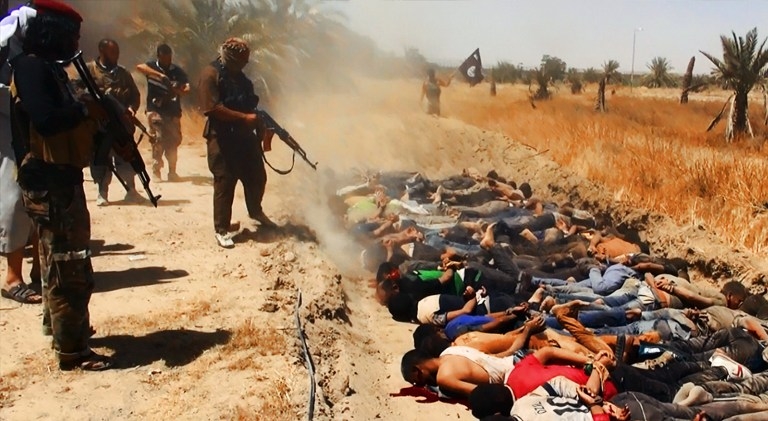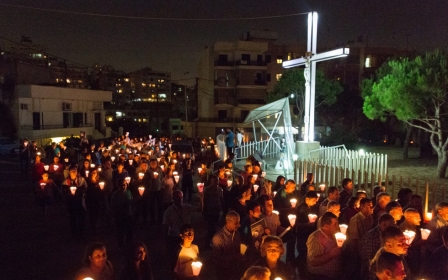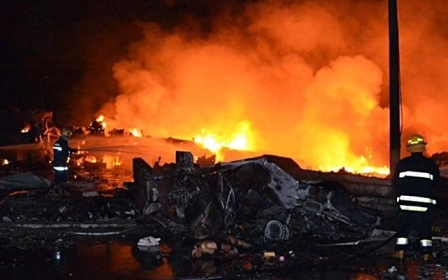The Islamic State: Back to the future

President Barack Obama was quick to authorize air strikes on the Islamic State (IS), once the armed group's takeover of territory led to the full or partial suspension of operations of major oil companies in northern Iraq.
The strikes are aimed at pushing the IS (formerly known as the Islamic State of Iraq and Syria among other names) away from the Kurdish region and have allowed Kurdish peshmerga forces to recapture positions lost to the IS.
Neighbouring regimes are feeling threatened by IS, a ruthless and daring group that has managed to take over vast areas of land in Iraq and Syria in a short time. The US has now at last decided to step in, though seemingly with no clear strategy.
Just as the rest of the world, Islamists in the region were surprised by the rise of the IS. It is a group so obscure that before the appearance of its leader, Abu Bakr al-Baghdadi, some suggested he might not exist, or that the group was the work of the abolished Iraqi Ba'ath Party or of one of the region's intelligence agencies.
Not a single known figure, jihadi or not, has endorsed the group. To the contrary, the IS has been denounced by the entire Islamist spectrum. To make sense of this state of affairs requires a look into Iraq's past.
Tragedy upon Tragedy
From the Iraqi invasion of Kuwait in 1990 through to the US invasion of Iraq in 2003, Iraq was under an economic embargo by the UN Security Council. The near total ban on financial transactions and trade that was designed to enervate the Iraqi regime was extremely harmful to Iraqis and had devastating effects on their standard of living.
Up until the late '90s. it was estimated in numerous studies that hundreds of thousands of Iraqi children under five years old died as a result of the economic embargo. In 1996, US secretary of state Madeline Albright, asked about the sanctions that had killed up to half a million children, said: "We think the price was worth it." Though she retracted her remarks after an uproar, it was taken as an acknowledgment of the high death toll.
Another chapter of Iraqi suffering started with the 2003 US and UK-led invasion of Iraq. Heavy bombardments of command and control centres of the Iraqi regime were part of George W Bush's "shock and awe" strategy. The invasion brought death, destruction, the scandals of Abu Ghraib, and other crimes.
Under occupation, Iraq's political and other social structures were redrawn along ethnic and sectarian lines, and "democratic" elections brought Shia parties to power with little Sunni representation. Shia "death squads" were formed and committed atrocities against Sunni civilians, including attempted ethnic cleansing of Baghdad, where hundreds of mutilated dead bodies were frequently found.
Many of these death squads originated from, or were backed by Iran. Ironically members of those militias were also members of the Iraqi police or military forces. Death squads, along with the state security forces, also managed many secret prisons where thousands of Sunnis were imprisoned, tortured, raped and killed. This was documented by the United Nations and other human rights organizations.
Bayan Jabr, the minister of interior in the Iraqi transitional government (2005-06),was a member of the Islamic Supreme Council of Iraq, whose armed wing, the "Badr Brigades, was one of the most notorious death squads in Iraq. It was accused by the United Nations human rights chief in Iraq of executing and torturing to death hundreds of Iraqis every month. Jabr was to become the minister of finance in Maliki's government.
Arab Spring hits Iraq
December 2012 marked the beginning of an uprising by Sunnis against Maliki's sectarian atrocities and marginalization, a revolt that followed the Arab Spring revolts against dictators in the region, events Iraqis had observed closely.
For months, several provinces in Iraq saw hundreds of thousands of people protest against Maliki's government. They made a list of 13 demands, including: the release of all political prisoners, and end to the death penalty and the anti-terrorism law (used to detain innocent people), an end to sectarian discrimination, public services for all Iraqi regions, and a holding account of those responsible for the rape of women in prisons.
The government did respond with the release of some innocent prisoners, but this was far short of the serious response being demanded. The violent dispersal of continuing protests ignited a full-blown Sunni rebellion. The Sunni Mufti (senior Islamic scholar) called for a jihad to be waged against Maliki's government, as did the head of Sunni tribes, all claiming that this was the last choice left to them.
IS vengeance
The IS for months has been making headlines with its extreme violence, yet when death squads roamed Iraq behaving in the same manner they did not get the same kind of media coverage. No serious attempts were made to stop the human rights violations of Maliki's sectarian government. Had state-sponsored terrorism in Iraq been addressed, IS would have remained a small group.
Iraq has now been devastated for decades. The young people who have joined the IS grew up under an economic embargo, then had to live through the Iraqi invasion and the sectarianism that followed. The death and destruction that mostly went unnoticed in the coverage of the Iraqi rebellion should be central to any analysis of the situation.
IS extremism is opposed to practically all Islamists in the region and those who disagree with it. In one of its audio releases, it states that the deposed Egyptian president Mohamed Morsi is an apostate. In Syria, it fights other Islamic factions, conducting numerous beheadings.
It is impossible to know how many of its members actually hold to such deviant beliefs. However, membership in the IS comes with permission to take revenge on the same security forces that made the lives of Sunnis in Iraq so intolerable.
The revenge against Shia is a central theme in their propaganda. For young, and perhaps older, people seeking to take revenge, it may seem more effective to join the IS than it is to join a smaller more local group; this, rather then the IS's extreme beliefs, may make it a more attractive way forward.
The Future
So far, it seems that Western countries are attempting only to contain the IS. Aside from air strikes, assistance is on its way to the peshmerga. The Shia in the south of Iraq are being left for Iran to assist, as always. This will only challenge the IS, not destroy it.
The IS does not seem to be completely lacking in pragmatism. They are cooperating with the Naqshabandi Army in Iraq, a Sufi militant organization run by Ba'athist ex-army officers. One of its central figures is Izzat Ibrahim al-Douri, a top Ba'ath official and army man under Saddam Hussein.
The fact that IS cooperates with a Sufi pan-Arabist organization is peculiar and should raise questions. Nonetheless the airstrikes that are conducted against the IS will be its first real test.
As many analysts have pointed out, the IS is unlikely to have a very long life cycle; however it could transform into something else.
One could point out to the stark similarities it has with the formation of the Saudi kingdom in the early 1900s, where Bedouin fighters under king-to-be Abdl Aziz bin Saud fought in Arabia and unified its lands. Without orders, the fighters conducted campaigns as far as the south of Iraq and Kuwait.
Bin Saud, however, had other plans and stopped this expansion, a decision that the fighters met with uproar and disgust. In the end, he had to let go those who disobeyed his orders, and slaughtered the horses they fought on.
Today's Middle East is obviously very different - and much more volatile, making it extremely difficult to predict specific outcomes. This is especially so given that the world's great power, the United States is going through a phase where more than ever it is realising the limits of its foreign policy.
Moreover, the underlying roots of the conflict in Iraq will still make militancy desirable and attractive, especially when there are hardly any venues for conflict resolution. In a recent West Point speech, Obama showed that the US has no desire to be directly involved in regional conflicts. However, the US will have to find partners in the region if it wants to keep its interests. Senator John McCain is again talking about arming the Free Syrian Army as he did two years ago.
So far, the Kurdish peshmerga are the only ones being armed and provided with on-ground consultation. Should IS leader Baghdadi be forced into making serious compromises, he will have internal problems from his plentiful overly eager young men, as did the first king of Saudi Arabia. He then might get a taste of his own medicine, but not any time soon.
- Mustafa Salama is a Political Analyst, Consultant and Freelance writer. Salama has extensive experience and academic background in Middle East Affairs. Salama holds a Bachelors and Masters degrees in Political Science from the American University in Cairo.
The views expressed in this article belong to the author and do not necessarily reflect the editorial policy of Middle East Eye.
Photo credit: IS fighters conduct a mass execution in Iraq (AFP)
Middle East Eye propose une couverture et une analyse indépendantes et incomparables du Moyen-Orient, de l’Afrique du Nord et d’autres régions du monde. Pour en savoir plus sur la reprise de ce contenu et les frais qui s’appliquent, veuillez remplir ce formulaire [en anglais]. Pour en savoir plus sur MEE, cliquez ici [en anglais].




